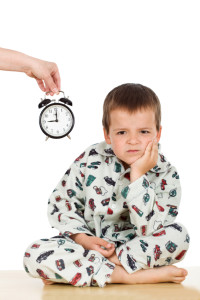More than a third of school age children may experience sleep problems. This can be range from not wanting to go to bed, not staying in their bed, having nightmares, sleep walking, difficulty settling into sleep, wanting parents to stay in the bedroom until the child falls asleep, snoring, sleep apnoea … the list goes on! 
Sleep problems are commonly divided into three categories: insomnia (not sleeping enough); hypersomnia (sleeping too much); and parasomnia (sleep disorders that involve abnormal movements, behaviours, emotions, perceptions, and dreams that occur while falling asleep, sleeping, between sleep stages, or during arousal from sleep) – for example, night terrors, or sleep talking.
Common Childhood Sleep Problems
Here are some of the most common childhood sleep problems:
- Insomnia. This is when a child has difficulties falling asleep, remaining asleep, and/or early morning awakenings. Insomnia may be due to stress and/or pain.
- Nightmares. These scary dreams occur during REM (Rapid Eye Movement) sleep and awaken a child; they usually occur later in the night. Most children have few nightmares during childhood, but a small percentage of pre-school and school aged children experience frequent nightmares. The causes may include stress, an event from the previous day, or trauma. Nightmares can be very upsetting for the children who will need reassurance when they occur.
- Sleep terrors. Unlike nightmares, these usually occur early in the night. The child may scream out and be distressed, although he/she is not awake or aware during a sleep terror. Sleep terrors may be caused by not getting enough sleep, an irregular sleep schedule, stress or sleeping in a new environment.
Studies from the Sleep Health Foundation (2011) show that pre-schoolers need between 11 to 13 hours of sleep a day, while school age children need between 9 and 11 hours, and teenagers still require an average of 9 hours of sleep a day. Children and teenagers often do not get enough sleep, and this could lead to behavioural problems during the day. Some of these could include:
- Becoming aggressive
- Being overtired
- Becoming over emotional
- Poor memory ability
- Irritability
- Difficulties in controlling their emotions
- Troubles with thinking and concentrating at school
- Decreased school performance
If your child is experiencing behavioural sleep problems such as difficulties getting to sleep or staying asleep, consistently experiencing nightmares or a reluctance to go to bed, visiting a psychologist specialising in the treatment of children can be of great benefit.
 Author: Meggy Delaunay, PG Dip Psych Practice, PG Dip Dev Psych, M Genetic Psych, B Psych, MAPS.
Author: Meggy Delaunay, PG Dip Psych Practice, PG Dip Dev Psych, M Genetic Psych, B Psych, MAPS.
Meggy Delaunay is a psychologist who primarily works with children, adolescents and young adults. She is a registered Psychologist in Australia, New Zealand and France, and can provide therapy sessions in English and French.
To make an appointment try Online Booking. Alternatively, you can call Vision Psychology Brisbane on (07) 3088 5422.